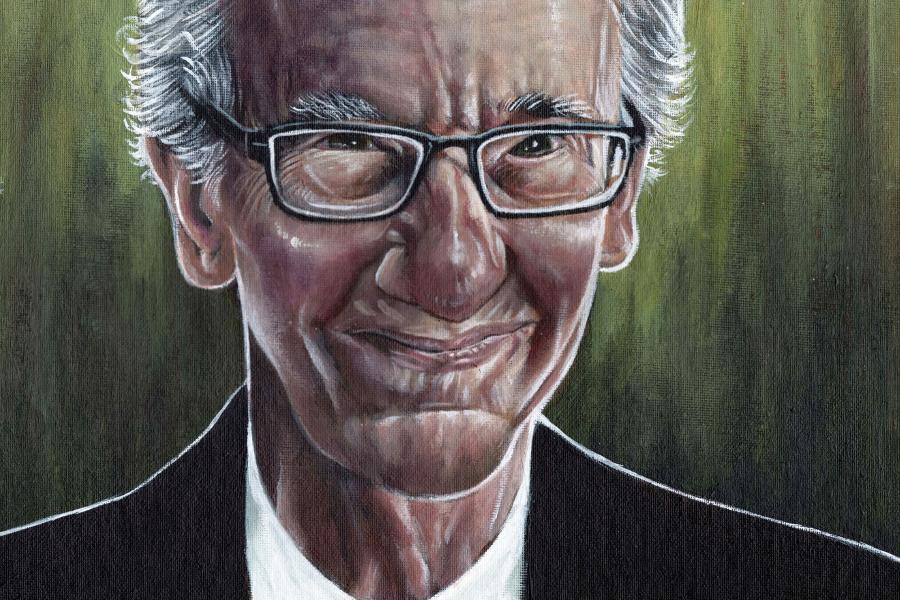Roland Griffiths is a self-defined skeptic—but he'll entertain the fanciful.
He first dabbled in meditation as a graduate student, and though talk of "heart chakras" left him dubious, he used the practice as metaphor and leaned in.
In a career that's melded scientific rigor with open-mindedness, Griffiths has blazed a new era into the research of psychedelics. He famously brought psilocybin—the active ingredient in "magic" mushrooms—back into the field of medical research for the first time in decades. Psychedelics were banned by the 1970 Controlled Substances Act and, before his work, the last legal dose of psilocybin given to an American was in 1977. In 1999, the psychopharmacologist, whose research had previously been focused on drug addiction, convinced Johns Hopkins School of Medicine leadership and government agencies to let him initiate a research program focused on psilocybin. In an initial study, most participants reported having "mystical-type" experiences, and 14 months later, two-thirds of those people described the experience as one of the five most meaningful of their lives.
Since then, his clinical trials and hundreds of published papers have shown the drug's significant therapeutic benefits for treating depression and nicotine addiction and, perhaps most dramatically, a profound reduction in end-of-life anxiety for people with cancer. The Center for Psychedelic and Consciousness Research at Johns Hopkins, which he founded, has been at the epicenter of it all.
Just over a year ago, Griffiths, who is 76, received a terminal stage 4 colon cancer diagnosis. But he says he's at peace. He's filled with "gratitude for the miracle of sentient existence" and hope for the future. As a legacy project, he recently created the Roland R. Griffiths PhD Professorship Fund, an endowed psychedelic research program that aims to "advance understanding of well-being and spirituality in the service of promoting human flourishing for generations to come."
In his own words, here is what Griffiths has to say about his life's journey.
On not flashing back to the 1960s
My initial focus has been on the approval of psychedelics as therapeutics. It seemed to me, from the very beginning, that we would need to proceed in baby steps, starting with evaluating safety and efficacy through existing regulatory and culturally accepted channels such as medical use. Otherwise, we run the risk of replicating the mistakes of the 1960s in which these compounds were actively promoted by poster children such as Timothy Leary for widespread use without appreciation for the risks to individuals or to broader culture. Although these compounds were showing therapeutic promise, the advocacy for widespread use resulted in a reflexive kickback from culture at large about potential dangers that ended up shutting down all clinical research for decades.
There are many today who say, "Well, the train's out of the station, there's absolutely no way to stop this." I don't know that to be true. I think that if we end up with a huge cultural pushback, whether or not it shuts down research again, it might create the divisiveness that we see play out in social media on all kinds of topics. And that too could set back the investigation of these fascinating compounds. Although research to date suggests these compounds are relatively safe, there are real risks that can result in injury, death, or onset of new debilitating psychiatric conditions. At a minimum we need to anticipate such problems rather than having the fanciful idea that there are no risks.
On finding a life's calling through meditation
Unlike some who have been drawn to study psychedelics after having some kind of remarkable personal experience with them, I became interested in studying psychedelics after initiating a regular meditation practice about 25 years ago. I was intrigued by the idea that for millennia different cultures had developed techniques of exploring the inner subjective landscape of mind. In 1994, I began attending some local meditation programs, and I became fascinated by meditation experiences and their implications.
The usual beginning meditation instruction sounds so simple. Just sit quietly and follow your breath or repeat a mantra. Simple until you try it. And then you realize you don't have much, if any, agency at all over what's coming into consciousness. For me, I became very aware of the voice in my head that was giving me a running commentary on who I was. I started listening to what that voice was saying and it was quite appalling.
One of the key things that came out of meditation, for me, was recognizing that the voice in your head is not you, nor are many of the thoughts and feelings such as pain or sadness or grief or happiness. They exist within the field of consciousness, and how you relate to those objects of consciousness is a primary determinant of your subsequent state of mind. So, if you treat the voice in your head as being you, then you may find you have one very judgmental, irritable overseer. And the goal would be to say to yourself, "Well, thank you very much for your opinion, but I'm choosing not to follow it."
On receiving a terminal cancer diagnosis
Initially the reaction was: This cannot be true. It's like a bad dream, and I'm going to awake from this. Over the course of several days, while more diagnostics were coming in to confirm the severity of the diagnosis, I started to explore the many psychological states that one could inhabit with such a diagnosis: fear and depression, anger, denial, fight mode. Another option would be to adopt a set of beliefs that allow you to celebrate death because it's going to lead to a wonderful afterlife. The latter just wasn't available to me because I'm a skeptic by nature. Although I certainly don't know what happens when we die, I put a low probability on many of the possibilities that are held out by some cultures and that appear, to me, to be largely fanciful in terms of a joyful ever after.
But what was on offer, and what initially drew me to meditation and into the study of psychedelics and the mind, was another option. For me, it's the practice of gratitude. It's the practice of the absolute wonder that we are these highly evolved sentient creatures who can hear and see and taste and locomote and build things. We have developed technologies and science for discovering things. We have developed culture. And yet the most interesting piece of all is that we are aware that we're aware. I'm here, and I know I'm here. So, to whatever extent I had thought myself to be "awake" prior to the diagnosis, there was this new sense of pristine awareness … of mindfulness. I explored the unfruitful states of mind for a few days, maybe a week after the diagnosis, and then emerged into this sense of joyful celebration. I found myself to be present, aware, astonished, and deeply grateful for the gift of existence.
On what happens to our brains on psychedelics
We're learning a lot.
We know that there are neurochemical, neurophysiological, and brain network changes that likely account for the effects we feel. These effects may result in enduring changes apart from the experience. For those of us in research, and those who have personal experience with psychedelics, it seems to be undeniable that the resulting change in sense of self and worldview is also critically important to the ultimate outcome. Under the correct conditions, people have experiences that can be described as transcendent, an interconnectedness of all people and things. Along with this sense of connectedness arises a sense that the experience is precious—or sacred, if you want to use religious terminology —and that it is absolutely true. This, in turn, may give rise to a strong prosocial impulse for mutual caretaking, with compelling ethical implications. It really boils down to the golden rule: Do unto others as you would have them do unto you.
I like the metaphor of reprogramming a computer operating system by changing the underlying machine code. A changed worldview and sense of self will result in different choices for how to behave going forward. I think that's super interesting, and we don't begin to understand it because of the complexity. Scientifically, we remain deeply ignorant about the nature of consciousness, which is the root of these experiences. We should be humble about our limited understanding of how such changes work at different levels of analysis. But that's also this beautiful opportunity to move this research forward in what I would consider the most impactful ways because there are these just gaping holes in what we don't know.
On ultimately practicing what he researches
As time progressed after my diagnosis, and because I'm involved with the psychedelic field, I was repeatedly asked why I had not personally sought out a psychedelic experience for psychological support. Initially I had no interest in doing so because I was already experiencing greater well-being than ever before in my life. And then I started wondering, well, wait a second. Am I defending against something and I'm just telling myself this story about having joy and equipoise? Is there something deeper and darker here? I then decided to stress test my psychological state by taking a psychedelic and asking myself, Are there any skeletons in the closet here? Is there any fear, anxiety? Are you being authentic in what you're saying? The answers that emerged from that inquiry felt personally validating, that everything was just as it should be and I was doing just what I should be doing. I was indeed going to die, but it's all OK. And furthermore, I got the strong sense that there was something of value in communicating to others what I was going through. That experience emboldened me to start talking out more explicitly. And that's been one of the motivators for my speaking to media and press about my situation as well as my endowment project aimed at contributing something that I believe will be of enduring significance to human culture.
On psychedelics treating a wide variety of psychiatric conditions
To date, my colleagues and I at the Johns Hopkins Center for Psychedelic and Consciousness Research have shown that psilocybin may have efficacy for treating a wide variety of psychiatric conditions such as psychological distress in patients with a life-threatening cancer diagnosis, alcohol addiction, cigarette addiction, depression, anxiety, and anorexia. It's curious, almost to the point of being unbelievable, that a single kind of intervention might be efficacious across these widely disparate medical conditions. It's fascinating and unprecedented within psychiatric treatment with medications. How could that be? And the answer is that there's a meta story going on here about a change in sense of self and worldview—the ability to let go of old narratives or old beliefs and opening oneself up to alternative ways of thinking and being. If you think about cigarette smoking addiction, for example, people come in identifying themselves as addicted smokers, and they have every reason to do so as they might have been smoking for decades. But if psilocybin can shake up the snow globe of existing beliefs, it may open a range of alternative possibilities. It is by no means determined that a chronic cigarette smoker needs to continue to smoke cigarettes. People may come to recognize that the urge to smoke is just that—it's just a feeling that's going to arise and dissipate in time. They can choose to say, "OK, yeah, I can put up with that."
On legalization and widespread use
I count myself among the very conservative with respect to the movements afoot to legalize and decriminalize psychedelics at scale. I am concerned that there are some totally unrealistic expectations of benefits that are going to be forthcoming without sufficient attention to potential catastrophic risk to individuals and then more broadly to culture. We don't want to replicate what happened in the 1960s.
On the Roland R. Griffiths PhD Professorship Fund
This idea for the endowment came right after my diagnosis when I started reworking the charitable contributions section of my will. My initial thought was to make a donation to effective charities such as GiveWell. But then I thought, "What would I really want to give?" The answer was to establish a professorship and fund to support a rigorous, world-class program of empirical psychedelic research on life-transformative experiences in the service of human flourishing. Psychedelics are the most powerful scientific tools currently available for conducting prospective studies of the causes and consequences of such experiences. We know that these kinds of mind-opening experiences, whether naturally occurring or occasioned by psychedelics or other interventions, can change personality, worldview, and life trajectories, and give rise to prosocial tendencies having important ethical implications, especially in the face of increasing existential threats, like the continuing development of biological and nuclear weapons, artificial intelligence, etc. The endowment, which is managed by Johns Hopkins, creates this research program in perpetuity—that is, forever! Although it may sound like overreach, I truly believe this line of research may ultimately be crucial for the survival of our species.
Posted in Science+Technology, Voices+Opinion










